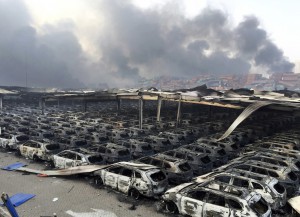
Thousands of charred vehicles after two explosions in Tianjin, China, wiped out 8,000 vehicles and injured more than 700 people and killed 50.
More than 7,500 vehicles went up in flames in the Chinese port city of Tianjin after two massive explosions at a nearby factory that killed 50 people and injured 700 more. The cause of the explosions is unknown at this time.
About 4,000 Hyundai-Kia vehicles, 2,750 Volkswagens and 1,500 Renaults that were waiting to be loaded and shipped from the port were destroyed, according to multiple reports.
Toyota also lost an unknown number of vehicles in the explosion, a Toyota spokesman told Automotive News, adding two employees at a nearby Toyota dealership were also injured by broken glass, but no one was killed.
The Japanese automaker operates a plant in Tianjin with its partner, FAW Group. The automaker just announced the addition of a new production line at the plant capable of 100,000 vehicles when at full capacity.
The loss of the Renault vehicles is estimated $33 million, according to Bloomberg. The Renault and Toyota vehicles were being stored warehouses that caught on fire.
(Trump pushes for factory worker salary cut to retain U.S. jobs. For more, Click Here.)
The explosions happened at plant owned by Tianjin Dongjiang Port Rui Hai International Logistics Co. Ltd., which has a history of violating rules related to international shipping, according to reports.
(Click Here for details about Tesla’s $500 million stock offering.)
The explosions were recorded by space satellites and so powerful that geologic agencies in Japan and the U.S. registered as “seismic events.” The warehouse allegedly contained large quantities of sodium cyanide, necessitating the arrival of more than 200 toxic waste specialists.
(To see what might be replacing the Bugatti Veyron, Click Here.)
The fires are under control now, but only after more than 1,000 firefighters – 12 of which died – and 143 fire trucks battled the blaze for more than 15 hours, according to reports. The owners of the warehouse have been placed under arrest.

What a surprise, people killed because of work place safety violations. Welcome to China.
Wow what a disaster and loss of human life.